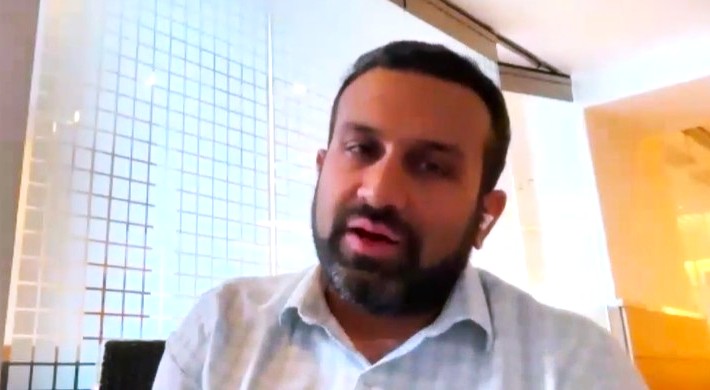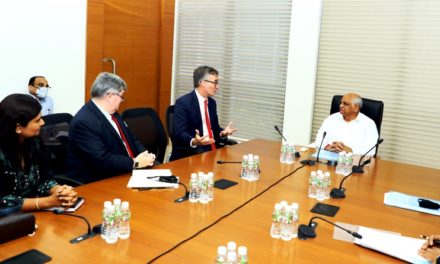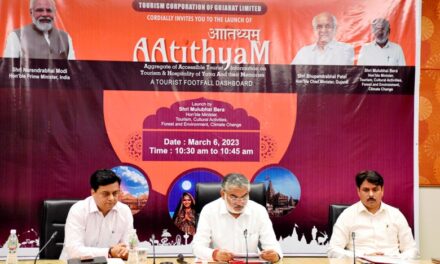Ahmedabad : The Confederation of Indian Industry (CII), Ahmedabad became the epicenter of a thought-provoking discussion on India’s Union Budget 2025-26. The gathering of finance experts, industrialists, and policymakers underscored the significance of the Budget in shaping India’s economic future, particularly in the realms of manufacturing, infrastructure, and innovation. During the session, industry leaders analyzed the Budget’s provisions, shared their perspectives, and deliberated on the transformative potential it holds for India’s industrial growth.
The highlight of the event was the thought-provoking remarks made by the chairman of CII Gujarat, Mr. Kulin Lalbhai, who emphasized the government’s continued focus on fostering a dynamic and competitive manufacturing sector. with that the immediate past chairman also emphasized that Budget 2025 sets the stage for a significant transformation in India’s industrial and logistics sectors, highlighting the manufacturing industry.
It is a very balanced budget. Fiscal Deficit has been reduced which is very important for micro economic stability. The other point is Capex is continuously at high level. Good amount of capex is happening. The credit guarantee scheme has been announced so now lots of MSMEs can take loan up to a certain level. On the other hand some relaxation has been given for Ease of doing business which is really good and also GIFT is on a very important focal point for the government in the context of future perspective for the Indian economy. For MSME, and CII is a body to play a role of a dissemination of best practices to MSMEs. CII also plays role on policy so, every time issues related to Ease of doing business, we take those issues to the government so that we can help enable MSMEs. The other thing is the cotton production in India is half of the world. Seed verities are lacking in India so by establishing National Cotton Mission we need to create R&D, next generation seeds, farming practices and if it will increase, farmers income will be increased and raw material security will also be guaranteed. FDI is always a welcome move. If India need to grow then it required large FDI. So, by increasing limits for FDI, foreign investment will get increased. So, liberalizing the structure of FDI is always welcome.
Kulin Lalbhai – Chairman, CII Gujarat and Vice Chairman – Arvind Ltd.
The Union Budget 2025-26 reflects the government’s steadfast commitment to fostering a robust and dynamic manufacturing ecosystem in India. The emphasis on technological innovation, sustainability, and infrastructure development will bolster the competitiveness of the manufacturing sector and drive industrial growth. Budget 2025 sets the stage for a significant transformation in India’s industrial and logistics sectors, highlighting the manufacturing industry. We applaud the government for its forward-looking policy measures, which create an environment conducive to investment and innovation. As industry leaders, we remain committed to partnering with the government to further strengthen India’s position as a global manufacturing hub and contribute to the nation’s economic prosperity.
Darshan Shah – Convenor – CII Gujarat State Manufacturing Panel, Immediate Past Chairman – CII Gujarat State Council & Managing Director, Hitachi Hi-Rel Power Electronics Private Limited
Key Highlights from the Discussion
The event, attended by some of the most prominent names in the business and industrial sectors, opened with a detailed overview of the Budget by financial experts, who underscored the importance of the 2025-26 provisions in propelling India’s economy toward global competitiveness.
Emphasis on Technological Innovation: Experts highlighted the government’s proactive stance on technological innovation and digital transformation. They noted that the Budget’s provisions supporting digital infrastructure, AI, IoT, and automation would catalyze growth in the manufacturing sector by enhancing efficiency, productivity, and global competitiveness.
Focus on Sustainability: Industry leaders expressed their appreciation for the Budget’s focus on sustainability, including incentives for green technologies and renewable energy. The extension of tax breaks for electric vehicles (EVs) and green energy projects was discussed as a significant step toward creating an eco-friendly industrial ecosystem in India.
Infrastructure Development: The Budget’s substantial focus on infrastructure development, particularly for logistics, transportation, and urban connectivity, was viewed as a game-changer. Experts emphasized that improving logistical networks and boosting industrial corridors would not only streamline operations for businesses but also reduce operational costs, making Indian manufacturing more competitive on the global stage.
Incentives for the Manufacturing Sector: One of the most applauded measures was the introduction of enhanced incentives for the manufacturing sector, aimed at driving domestic production and exports. Panelists argued that these provisions would pave the way for creating more job opportunities and boosting industrial output, especially in the MSME (Micro, Small, and Medium Enterprises) space.










